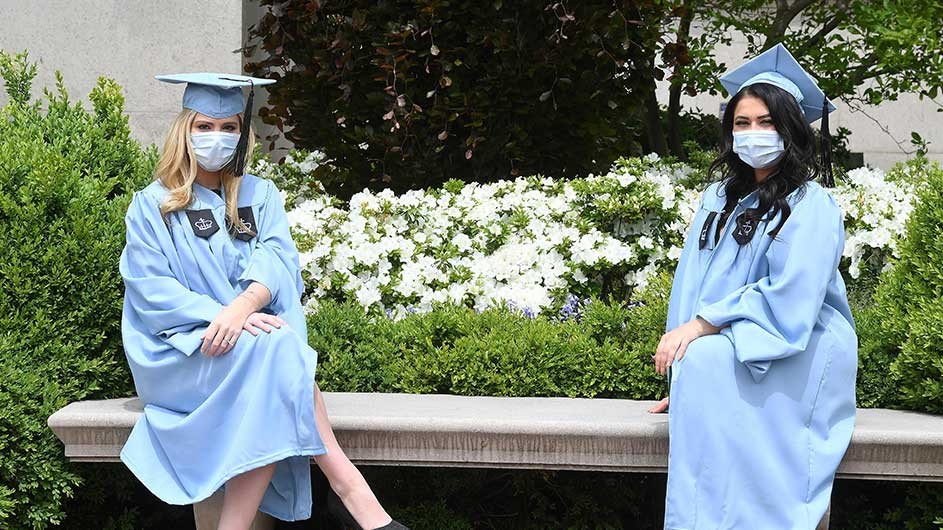University Archives Will Document COVID-19 at Columbia
A questionnaire and a website aim to capture the many voices and views of faculty, students, staff and alumni who are living through the pandemic.

COVID-19 may not be the first pandemic Columbia has responded to (think Spanish Flu, 1918), but it is the first one that prompted the closure of the campus. Students were sent home mid-semester, classes moved online, non-essential staff and faculty started working remotely and commencement was virtual.
Even before the shutdown of campus in mid-March, “it was clear that this health crisis was out of the ordinary,” said University Archivist Jocelyn Wilk.
Back in late January, Wilk and her colleagues had started gathering COVID-19-related informational emails. Once she began working remotely, she received an email from Stephen Novak, head of archives and special collections at the Augustus C. Long Health Sciences Library at Columbia University Irving Medical Center. “What can we do to document the pandemic?” he asked her.
Similar questions and posts from archivists at other universities prompted Wilk and her team at Columbia Libraries to start conducting formal documentation efforts. She and her colleagues realized that they needed to do more than save emails and other pandemic-connected material such as websites and official records from Columbia administration. One idea they had was to create a questionnaire and distribute it widely in the hope of getting feedback about the experiences of individuals who had to leave campus quickly, enter quarantine, and shift to online classes and work.
After further consultation with colleagues at peer institutions, Wilk; Joanna Rios, records manager at the Rare Book & Manuscript Library (RBML), which oversees University Archives; and Nisa Bakkalbasi, associate director of the Libraries’ assessment program, settled on adapting a survey being used by Cornell. They started circulating it among faculty, students, staff, alumni and other members of the Columbia community during the week of April 15 in an attempt to capture as many pandemic perspectives as possible.
As of late May, there have been several hundred anonymous responses from across the University—graduate and undergraduate students, alums, professors and employees, offering a range of honest, thoughtful and moving accounts of life in quarantine.
Here are some examples:
What is daily life like for you right now?
“Figuring out how to keep contact between my child and her dad. He is still working with the public and went four weeks without seeing her because of the risk of exposure. It has also been difficult to see people and family members I typically think of as being quite emotionally strong actually really struggle. People will seem good and then I will get a late evening call and they’re breaking down.” -- Alumna
What has been the most difficult part of this experience?
“The hardest part is the uncertainty; not knowing exactly where the virus lingers at any given time, how long it lingers, how we will return to normal life, if we will return to normal life, if I will get sick, if a loved one will get sick… and on and on.” – Student, Graduate School of Arts and Sciences
What aspects of Columbia have you missed most during this period of disruption?
“I miss my friends… I miss buying iced coffees… I miss running in Central Park… I miss small conversations in the elevators. I miss the crowded, steamy laundry room. I miss putting my homework aside to laugh for a little bit. I miss my roommate and telling her bedtime stories when we can't fall asleep. I miss Low Steps.” -- Undergraduate Student, Columbia College
How have you stayed in touch with the Columbia community?
“I attend Zoom gatherings organized by my office. I have stayed in contact with friends who are also members of the Columbia community. These remote interactions were useful, and provided fleeting relief. Nothing has soothed the painful sense of isolation caused by physical distance, in particular now, as the semester ends without any of the usual celebratory gatherings.” – Faculty Member
Wilk and her team also launched Documenting COVID-19 at Columbia, a comprehensive webpage on the Libraries site that has links to the questionnaire, various coronavirus-related Columbia websites and other resources, as well as similar documentation efforts such as Human Resources’ Columbia Together and INCITE / The Columbia Center for Oral History Research’s NYC Covid -19 Oral History, Narrative and Memory Archive.
Novak, the archivist at the medical center, has created a similar webpage to collect personal narratives, emails, photographs, videos, voice memos, audio recordings and other digital evidence to document the ongoing pandemic for members of Columbia’s schools of medicine, nursing, public health and dentistry. In time, the Health Sciences Library will receive these schools’ official administrative records from this period to complement the personal accounts.
Key for Novak is gathering this material now while the experiences are still fresh. “What was it like for our faculty and staff (and some students) who were on the front lines providing care to COVID-19 patients?” he said.
“This situation is so fluid and changeable that we want to keep our survey open as long as necessary,” said Wilk. “Depending on what the fall semester looks like, we may close this survey toward the end of the summer and replace it with a new one, allowing us to capture the next phase of the health crisis.”
“Collecting the past begins with documenting the present. This project exemplifies the kind of foresight that Columbia’s archivists, curators and librarians bring to their work in both ordinary and extraordinary times," added RBML director Sean Quimby.
If you want to share your experiences, please consider filling out the University Archives COVID-19 Experience Questionnaire.